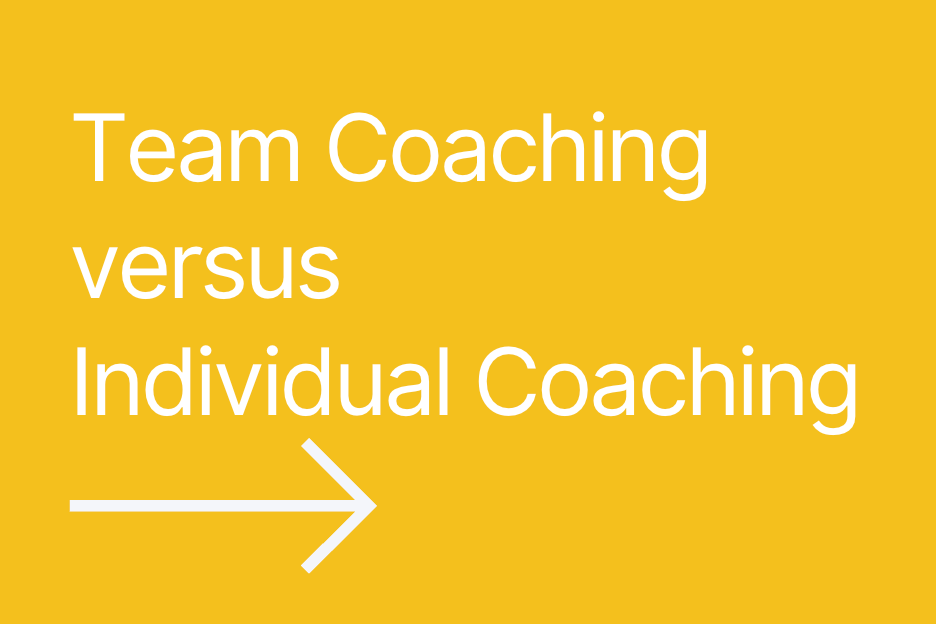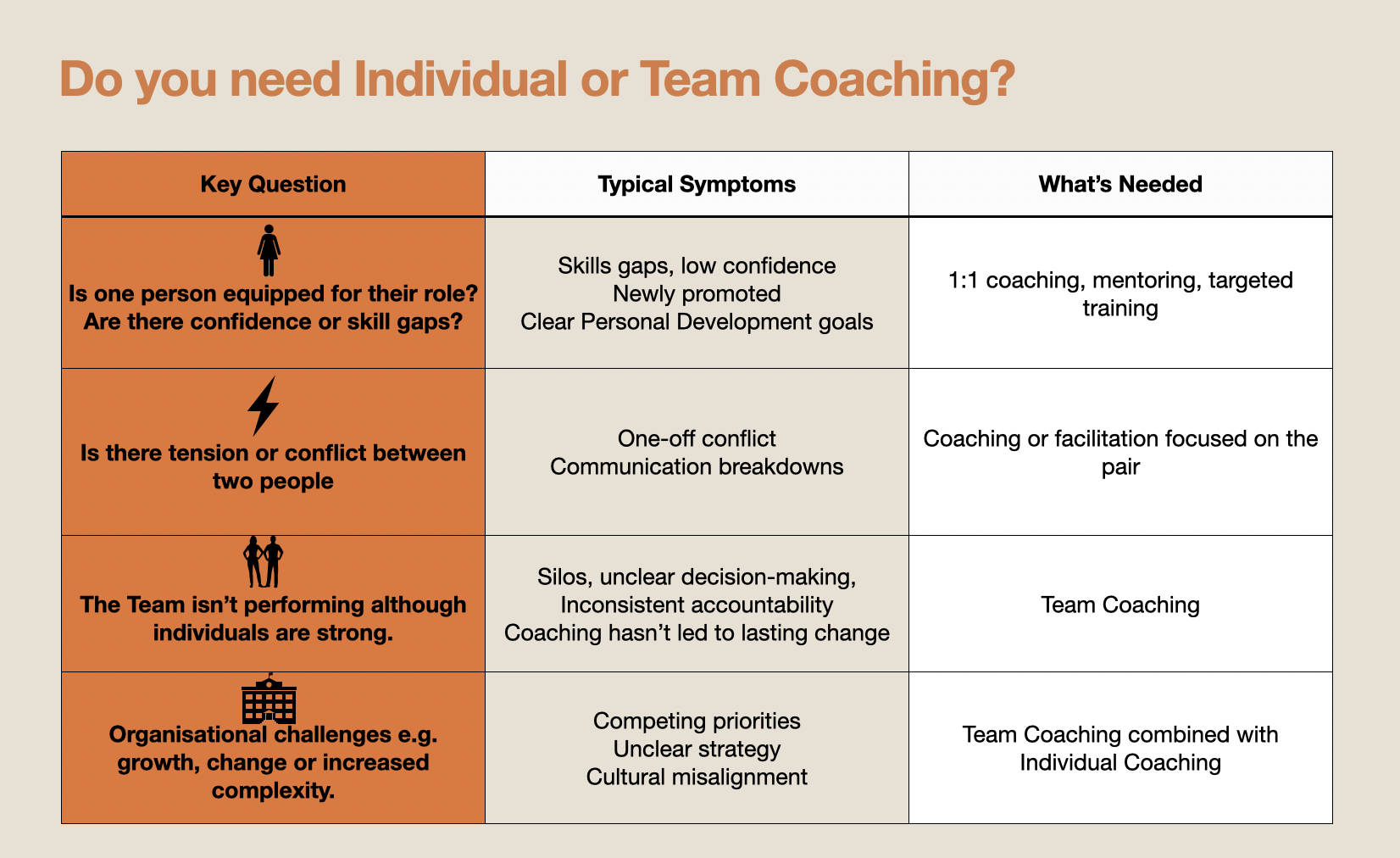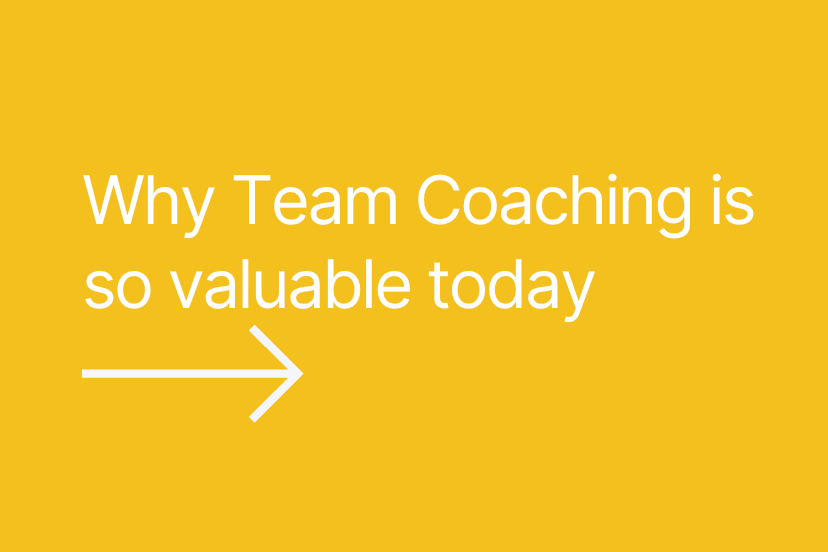
BLOG
Inspiration and news
Team Coaching verus Individual Coaching
You’ve invested in coaching for individuals, but something still isn’t shifting. This is where lots of organisations get stuck: it’s easy to assume the problem lies with an individual and to send them for coaching. But sometimes, the challenge isn’t one person, it’s in how the team works together (or doesn’t).
That’s where Team Coaching comes in.
How to spot whether you're dealing with a personal development need or something in the team dynamic.
You’ve invested in coaching for individuals, but something still isn’t shifting. Perhaps meetings are going round in circles, communication. feels clunky, decisions are slow, people aren’t doing what they say they will, and there may be tension in the air, but no one’s naming it.
So what’s the real issue? And what do you do now?
This is where lots of organisations get stuck: it’s easy to assume the problem lies with an individual and to send them for coaching. But sometimes, the challenge isn’t one person, it’s systemic. It’s something in how the team works together (or doesn’t).
What Individual Coaching Does Brilliantly
Stepping into a new role, tackling imposter syndrome, and adjusting to a new level of responsibility.
Developing confidence with giving feedback, difficult conversations, influencing, or strategic thinking.
Working through personal blocks like conflict avoidance or perfectionism.
Self-Awareness and EQ – Deepening reflection and emotional intelligence.
How to spot when Individual Coaching isn’t enough
The Revolving Door Problem - your leaders have been coached on similar issues, but the patterns repeat. It’s not them. It’s the system they’re in.
The Post-Coaching Plateau - Someone returns energised from coaching, but nothing changes. Their insight doesn’t stick because the team’s culture and habits haven’t changed.
The Invisible Stakeholder Trap - People make decisions without input from the right people. Coaching might help one person ask better questions, but it won’t fix the wider issue of unclear stakeholder engagement.
The Accountability Gap - People hesitate to call things out or challenge one another. Assertiveness coaching won’t help if the team hasn’t built psychological safety.
Competing Priorities, Constantly - Each person is doing their job well, but they’re heading in different directions. The team hasn’t agreed on what success looks like together.
What Team Coaching Builds That Individual Coaching Can’t
When the root causes are systemic, team coaching focuses on the collective, not just the individuals. Here’s what that can unlock:
Stakeholder-Focused Thinking - Teams get clearer on who they serve (internally and externally) and align around what their stakeholders truly need. Instead of each person building their shared stakeholder map, the team co-creates one together.
Joined-Up Decisions and Priorities - Team coaching surfaces how decisions are made (or not). It helps the team agree on how to prioritise, who decides what, and where alignment is needed, so there’s more clarity and less second-guessing.
Honest, Constructive Dialogue - Instead of avoiding the hard conversations, teams learn how to speak openly and disagree productively. This builds trust and psychological safety and gives people shared tools and language for navigating tension.
Collective Learning and Adaptability - Teams need space to reflect together—not just individually. Coaching encourages habits of reflection, experimentation, and shared learning that help the team improve how they work over time.
Shared Leadership and Collaboration - It’s not always about who’s in charge. It’s about flexing leadership based on strengths, context and what’s needed. Team coaching helps teams move from hub and spoke leadership to shared responsibility.
Integrating Individual and Team Coaching
The most powerful transformation happens when individual and team coaching work together strategically:
Individual coaching to ensure each team member has the personal foundation for effective collaboration
Team coaching to build collective capability and address systemic issues,
Individual coaching to help leaders integrate new team practices into their personal leadership approach
One size does not fit all
The question isn't whether individual or team coaching is better; it's about discovering which is right for the the challenge, the individuals and the team.
The most successful organisations I work with treat individual and team coaching as complementary capabilities in their leadership development toolkit. They invest in both, but deploy them strategically based on an accurate diagnosis of what's really needed.
Not Sure What You Need - I Can Help
If you’re not sure whether the issue sits with one person or the team as a whole, I can help.
My work often begins with a short discovery phase: a series of interviews, a team diagnostic, or a workshop to help you understand what’s really going on. From there, we can clarify whether individual coaching, team coaching, or a combination of both will move things forward.
Learn more about how I support Team Effectiveness >
Discover how I support Leaders and Individuals through Coaching >
Or get in touch to start a conversation about what might be possible for your team.
Email: polly@pollyrobinson.co.uk or call 07966 475195.
Why Team Coaching Is What Organisations Need Today
Effective Teams create successful organisations. Why Coaching teams, not just individuals, is what organisations need today.
The missing piece in creating truly effective teams
We've become exceptionally good at developing individual leaders. Executive Coaching builds confidence and emotional intelligence, and Leadership Programmes develop strategic thinking. These investments do work for individual development.
But team performance isn’t simply the sum of the individual parts; it’s about how well people work together - how they collaborate, make decisions, and achieve together collectively what they couldn’t do on their own.
And that’s the gap: teams are often left to figure out collaboration, clarity, trust, and accountability on their own. We assume teamwork will just happen, especially if the individuals are skilled.
But what I see is that you can have a group of brilliant people, but they still struggle to function as an effective team.
Individual excellence is important. But team effectiveness is what drives outcomes.
In most organisations, the most critical work is done in teams, whether that’s a senior leadership team, a product or project team or a cross-functional working group. But without being intentional, teams easily find themselves:
Working in silos
Second-guessing each other
Avoiding tricky conversations
Struggling to make decisions
Dropping the ball on shared goals
Complex Systems
Today, teams operate in increasingly complex systems, including balancing the needs of multiple Stakeholders from customers, employees, investors, and communities. The VUCA (Volatile, Uncertain, Changeable and Ambiguous) environment means teams need to sense, adapt, and respond together faster and under more pressure than ever before.
The Hidden Barriers to Team Effectiveness
Through my work with leadership teams and cross-functional groups, I've identified five critical barriers that consistently undermine performance:
1. Unspoken Assumptions
Teams operate on unstated assumptions about purpose, priorities, and process. A leadership team I worked with discovered they had three different interpretations of their strategic priorities. No wonder they felt fragmented.
2. Reluctance to share ideas and be honest.
Many teams avoid difficult conversations, dance around tensions, and make pseudo-decisions that unravel in implementation. Building Psychological Safety helps teams to engage in healthy and constructive dissent.
3. Working in Silos
This needs no explanation - silos create internal competition and misaligned priorities.
4. Not sharing and collaborating
Teams make decisions with incomplete information because they don’t collectively gather and share knowledge - this is particularly common in hybrid and remote teams.
5. Being Busy Fools
Most teams are too busy moving from one project or task to the next without taking time to explore what went well, what needs improving. This leads to repeating ineffective habits or practices.
Why team coaching?
Team coaching isn't a training programme or team building exercise. It’s a systemic approach that gives teams space, structure and support to:
Align around shared purpose and goals, improving collaboration, accountability and results.
Understand how they’re experienced by stakeholders (customers, suppliers and colleagues).
Navigate complexity and interdependence
Improve psychological safety, trust, feedback, and communication.
Strengthen their impact on the wider system they’re part of.
This is especially important in today’s world, where most challenges can’t be solved by one person, one team, or one department alone.
Organisations are systems.
When we say organisations are systems, we mean they are interconnected, dynamic, and constantly evolving. What happens in one area affects another, sometimes in obvious ways, often in hidden ones.
A decision made in HR ripples into Finance. A tension in one team affects how another communicates. A disconnect between the board and delivery teams shows up in morale, trust, or results.
Systemic team coaching helps teams understand these connections so they can operate more effectively within their team and between other teams and stakeholders. It brings the “outside in” and encourages teams to think beyond their function or agenda.
I’ve worked with teams navigating growth, restructuring, service pressures, or new leadership. Often, they’re not struggling because they don’t care or aren’t capable; they’re struggling because no one’s created the space for honest conversations, shared clarity, and team learning.
Team coaching changes that.
We start with where the team is now. We look at what’s working and what’s getting in the way. And we co-create new ways of working that improve trust, decision-making, and delivery. Over time, I’ve seen teams:
Reset after change
Strengthen cross-team relationships
Improve communication and meeting culture
Clarify roles, purpose, and priorities
Reconnect with the bigger picture and their stakeholders
Do we need Team Coaching?
If you’re part of a team, or managing one, that’s facing complexity, change or growth or if your team is experiencing any of these patterns, team coaching could be what you need.
Individual performance is strong, but collective results are inconsistent
Decisions take too long or get revisited repeatedly
Stakeholder feedback suggests disconnection or misalignment
Team members feel frustrated with collaboration
Change initiatives stall in implementation
There's a sense the team could achieve more together
How Growth Space can help
We have developed a framework for Systemic Team Coaching (inspired by Patrick Leconi and Professor Peter Hawkins). A Team Coaching programme typically involves 4-6 sessions over a few months. It’s a chance for teams to:
Reflect on how they work together
Surface and shift unhelpful patterns
Build trust and psychological safety
Align behind shared goals and behaviours
Strengthen their collective leadership across the wider business
We use practical frameworks including Team Charters, personal user manuals, role clarity tools, and create a safe, structured space for honest conversation and inclusive facilitation where everyone has a voice.
Get in touch to chat about your team and how Team Coaching could help:
Email: polly@pollyrobinson.co.uk
Call: 07966 475195



